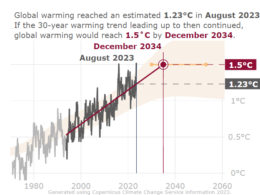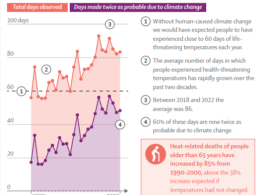The health strategist
institute, portal & consulting
for workforce health & economic prosperity
Joaquim Cardoso MSc.
Servant Leader, Chief Research & Strategy Officer (CRSO),
Editor in Chief and Senior Advisor
January 11, 2024
This executive summary is based on the article “Oceans break heat records five years in a row”, published by Nature and written by Xiaoying You, on January 11, 2024.
What is the message?
The world’s oceans experienced unprecedented heat absorption in 2023, setting a record for the fifth consecutive year, as reported by an annual study led by the Institute of Atmospheric Physics (IAP) at the Chinese Academy of Sciences.
The research underscores the alarming trend of increasing ocean temperatures, attributing it to the surge in human-generated greenhouse gases in the atmosphere.
Ocean heat content emerges as a robust indicator of global climate change, reflecting consistent warming trends and presenting significant implications for sea levels, weather patterns, and marine life.

ONE PAGE SUMMARY
What are the key points?
Record-Breaking Heat Absorption:
The oceans absorbed more heat in 2023 than in any previous year since records began, marking the fifth consecutive year of record-breaking warmth.
The study, led by the IAP with 34 scientists from 19 research organizations across five countries, highlights the concerning acceleration in ocean warming trends since 2019.
Human Impact on Greenhouse Gases:
Cheng Lijing, the lead author and oceanographer at IAP, attributes the rising ocean temperatures to the increasing levels of human-generated greenhouse gases in the atmosphere.
Ocean heat content is identified as a particularly robust indicator of global climate change, less influenced by natural fluctuations than air and sea surface temperatures.
Enormous Heat Increase:
The heat stored in the upper 2,000 meters of oceans surged by 15 zettajoules in 2023, a substantial rise compared to 2022. For context, the world’s total energy consumption in 2022 was approximately 0.6 zettajoules.
Discrepancies in data between the IAP and the National Centers for Environmental Information (NCEI) highlight the consistent warming trend despite calculation variations.
Impacts on Sea Levels and Life:
Svetlana Jevrejeva, a sea-level scientist, emphasizes the robust observational evidence that the oceans were the warmest on record in 2023.
Ocean warming contributes to about 50% of current sea-level rise, with potential ramifications for extreme weather events and global weather patterns.
Ecological Consequences:
Marine ecologist William Cheung warns of potential shifts in the distribution of marine life, migration pattern alterations, and changes in reproductive cycles due to ocean warming.
Christina Hulbe, a glaciologist, stresses the urgency of reducing greenhouse gas emissions to avoid triggering critical tipping points with unknown consequences.



What are the key statistics?
The IAP data indicates a 15 zettajoule increase in ocean heat content in 2023, while NCEI reports a 9 zettajoule increase, emphasizing consistent warming trends.
What are the key examples?
The study draws attention to the impact of rapid ocean warming on sea-level rise, intensification of extreme weather events, and potential ecological shifts, emphasizing the interconnectedness of climate factors.
Conclusion
The findings underscore the critical need to address climate change by reducing greenhouse gas emissions.
Urgent action is required to curb the alarming trend of ocean warming, mitigate potential ecological consequences, and prevent triggering irreversible tipping points.
The study serves as a stark reminder of the immediate need for global efforts to combat climate change and its far-reaching impacts on the world’s oceans.
To read the original publication, click here.












